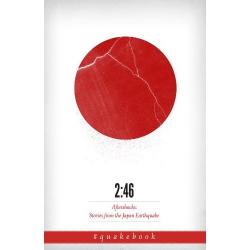2:46: Aftershocks: Stories from the Japan Earthquake

By The Quakebook Community (www.quakebook.org), edited by Our Man in Abiko, Enhanced Studios Ltd, 2011, 102 pages including photography and artwork, US$11.99, I S B N: 0956883621 and also (Kindle Edition, 1435 KB, ASIN: B004VP3KHK)
Review by William Farr
Originally called Quakebook on Twitter, 2:46 is a collection of stories about the tsunami and earthquake, which exploded onto the book scene in March of 2011. This was a result of one individual’s simple question to Twitter users: “What can we do?” Whilst many people the world over sat and watched the unfolding disaster on TV and newspapers not knowing how to help, 2:46 got crowdsourcing. Crowdsourcing refers to using people’s collective knowledge as a resource to get things done. Soon, over 100 individuals, all over world with contacts in all types of industries responded and “Quakebook” was born. People, who prior to the earthquake had absolutely nothing in common, joined forces over Twitter and each wrote 250 words, or contributed artwork or photographs about their experiences of the earthquake. The first draft was completed within a week, and the book evolved in its first incarnation into a digital book for Amazon Kindle and other electronic readers. 2:46 was rolled out for download without major companies taking their usual cut. All fees and costs, and the price of the book went straight to the Japanese Red Cross. The book is now available in physical form, and there are continuing efforts by the Quakebook Community, such as the book being available in Japan now in bilingual format. Copies have made it as far as the British Embassy in Tokyo, and the Japan Centre in London. And the work is spreading.
The book itself is made up of short, often intensely personal views on the earthquake. For example, the “First Experience” written by Yoshiko Ikeda talks about a photograph, reprinted in the book, of a girl sat on the side of the road head buried in her hands. A simple caption, written by the journalist who took the photo, states that the girl had lost her family. Devastating. The author goes on to talk about how places we have never heard of before suddenly become known to the international community. Ishinomaki, Rikuzen-takata, Nobiru, Fukushima, are all places now spoken of by people who before the disaster had no prior knowledge of Japanese geography. Hauntingly, this first author also foresees the fallout that subsequently occurred to the normal flow of goods, as Japanese schools dug up and removed topsoil, beef was not tracked properly as it went onto the market place, and shipping containers turned up in Holland and were then impounded due to high levels of radiation.
Some authors are not in Japan at all, but still contribute incredibly moving pieces. Others were in Japan at the time of the quake such as Sandra Barron, who we presume to be a journalist, but then returns to Los Angeles whilst the danger passes. Guilt is clear in this piece, but the author is not alone, as a University friend who is now in financier in Tokyo upped sticks and moved his whole family home to California whilst the tragedy was unfolding. Sandra Barron’s family worried about her wellbeing, but she also rightly believes that her presence in Japan at the time of the earthquake would have been a drain on resources such as water and electricity, logic hard to argue with.
The wealth of perspectives is the strength of the book, from known voices such as Yoko Ono Lennon, Jake Adelstein, and William Gibson, to other people with something to say who are not famous but are genuine everymen. At times the stories seem to contradict, as not all people agree on how to grieve; at other times they are all in chorus. This is what makes this book so powerful: there are no answers here, there is solace, there is thoughtfulness, and reflection.
Jake Adelstein’s “Muenbotoke” in particular is an incredibly insightful piece, juxtaposing news report extracts of the earthquake with his own experiences as a journalist of death and dying. Adelstein remembers reporting a double suicide where the couple in question simply gave up. No connections, no family, nobody except Jake Adelstein really took an interest in what happened to their ashes. Where would their resting place be? Who would visit the temple? The couple, muenbotoke [無縁仏], refers to individuals without a connection who have no one to claim their ashes, and are literally a Buddha with no ties. Adelstein rightly points out that we need to respect the memory of people who will have disappeared without trace, and need to be remembered.
At an extremely early stage in the unfolding disaster, 2:46 dealt with so many angles of potential problems, opinions and thoughts for loved ones, with the delicate grace and intelligence that betrays the breadth of the human condition. This breadth is exactly what one would expect when people from all walks of life come together to speak out for people who are left without a voice. Quakebook has been like a large stone dropped into what was prior to March 11th 2011 a still lake, but the ripples of its impact are moving outward in ever increasing circles. Spread the word and buy 2:46, as the disaster is not gone and continues for the displaced, the homeless, and the orphaned. As the editor, Our Man in Abiko says in the introduction: “Those of us who live in Japan are in a state of war. But not a war against a nation, or even nature. We are fighting defeat, worry and hopelessness. The question is: “Are we strong enough to overcome?”

